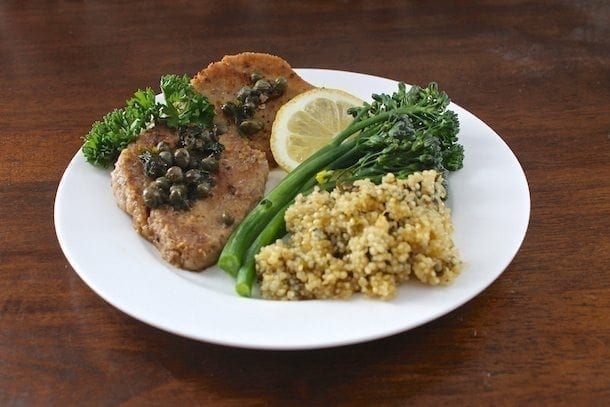 If you’ve checked your Twitter feed in the last few hours, chances are #MeatlessMonday has popped up at least once. The goal of this trend is to kick-start your week with veggies, and become more aware of what you are eating in general, so you can make healthier choices all week. Why go meat-free for the day? Cutting back on your meat intake comes with tons of healthy benefits—to name a few: it decreases your chances of obesity, heart disease and diabetes.
If you’ve checked your Twitter feed in the last few hours, chances are #MeatlessMonday has popped up at least once. The goal of this trend is to kick-start your week with veggies, and become more aware of what you are eating in general, so you can make healthier choices all week. Why go meat-free for the day? Cutting back on your meat intake comes with tons of healthy benefits—to name a few: it decreases your chances of obesity, heart disease and diabetes.
If the idea of avoiding meat, even just for one day, leaves you wondering, “How will I get enough protein?” You’re not alone—it’s a worry plenty of people have. But it turns out getting enough of this important nutrient is easier than it seems. There are plenty of plant-based sources of protein that are easy to cook and taste amazing, too.
Tofu & Tempeh Tofu is probably the first food that comes to mind when thinking of vegetarian meat substitutes, and for good reason! Tofu and tempeh are made from soybeans, and they’re incredible sources of protein. Tempeh contains 15 grams of protein per half cup, while tofu offers 20 grams! Both have unique textures that easily absorb the flavor of whatever you are cooking, making them ideal in stir-fries, or seasoned and baked.
Seitan While not as well known as tofu, seitan is a versatile meat substitute made from wheat gluten that packs tons of protein—32 grams per half cup! It’s a great replacement for poultry, and is very simple to cook.
Quinoa Most grains are low in protein, but quinoa has more than 8 grams per cup! Quinoa is delicious as a side dish (try it in place of rice), and works well as a hot or cold breakfast. You can also toss a handful of cooked quinoa into soup or chili to thicken things up.
Beans Beans are little powerhouses of nutrition. High in both protein and fiber, they keep you feeling full longer and provide your body with tons of energy. How much protein are we talking about? 1 cup of kidney beans is loaded with 15 grams of protein, and 1 cup of black beans contains 42 grams! Keep in mind: canned beans tend to be high in sodium, so be sure rinse them before using.
Nuts & Nut Butters Nuts get a bad rap for being fattening, but they are packed with both healthy fats and protein. Most varieties have 5 to 6 grams of protein per ounce, which means you don’t have to eat too many to get a protein boost. To maximize the health benefits, look for unsalted, raw, or roasted nuts, and opt for nut-butters made without any added sugars or oils.
Seeds Like their nutty counterparts, seeds, such as sunflower, sesame and poppy, are filled with protein and healthy fats. Sunflower seeds, for example, have almost 15 grams of protein per cup. They’re delicious toasted and sprinkled on top of a salad.
Greens While green vegetables may not be the protein powerhouses that beans, nuts, and seeds are, ounce for ounce, they still hold their own. Packed with fiber to keep you feeling full, 2 cups of spinach (easy side salad!) contains 2 grams of protein, and a cup of broccoli has 3 grams.
Need help planning a plant-based meal? Try this easy Lemon & White Wine Seitan with Quinoa and Broccolini dish that I created just for MyFitnessPal. (The recipe is in the database for easy logging!)
Lemon & White Wine Seitan with Quinoa and Broccolini
Ingredients:
- 3/4 cup Quinoa
- 8 oz. White Table Wine
- 6 oz. Water
- 1/4 cup Parsley, raw
- 6 tbsp. Lemon Juice
- 10 oz. Broccolini
- 12 oz. Seitan, sliced
- 1/4 tsp Black Pepper, ground
- 1/3 cup Whole-Grain Wheat Flour
- 2 tsp. Coconut Oil
- 2 tsp. Capers, canned
Directions:
In a medium pot, mix together ¾-cup quinoa, 6 oz. of the white table wine, 6 oz. water, 2 tbsp. of the parsley, and 2 tbsp. of the lemon juice. Bring to a boil, and then reduce heat to a simmer. Cook for about 20 minutes, until all liquid has been absorbed, and quinoa is fluffy.
While quinoa is cooking, place broccolini in a steam basket in a pot of water, and steam for 10 minutes, or until softened but still a crisp green color.
Meanwhile, slice the seitan into eight pieces. Sprinkle with black pepper and coat thoroughly with flour. In a sauté pan, heat coconut oil on medium high heat until warm. Place seitan slices in pan and cook until flour begins to golden, about 3 to 4 minutes. Flip slices, and pour 2 tbsp. of the lemon juice over the pieces into the pan. Cook until bottom is golden brown, and then remove from the pan.
Increase the heat of the pan to high, and let the remaining oils and liquid heat up. Add capers and let cook for 1 to 2 minutes. Add 2 oz. of the white wine, and 2 tbsp. of the lemon juice; heat for 1 to 2 minutes, until warm. Add 2 tbsp. parsley and cook for about 3 seconds more. Pour sauce over seitan pieces, and serve with quinoa and broccolini.
Serves 4; 373 calories and 32 grams of protein per serving.
What do you think of #MeatlessMonday? Are you planning a meat-free meal today?




